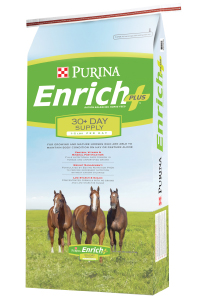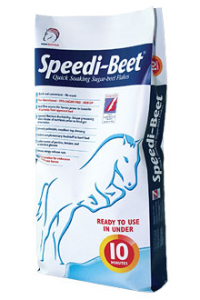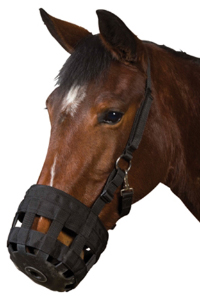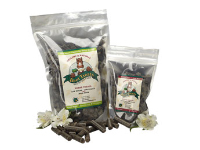Equine metabolic syndrome (EMS) is not a specific disease, but rather a clinical syndrome with three principal components: obesity, hyperinsulinemia, and insulin resistance (IR). EMS horses are predisposed to a variety of health issues including laminitis, so proper dietary management of these animals is essential. Dietary management can address two strategies to treat EMS: increasing weight loss and increasing insulin sensitivity. For the infographic click here.
Dietary Changes
Just like in obese humans and other animals, management starts with dietary changes. For horse owners, this can be the biggest challenge, since a high level of emotions can be involved. Who doesn’t feel bad when they have to reduce their fleshy horse’s grain? How many barn owners give that pudgy pony a handful of grain as they walk by at feeding time just because it’s calling out? Despite the negative emotions it may bring on, dietary restriction is a key requirement for long-term EMS management.
 The first step is to adjust your horse’s diet to maintain a proper body condition score (BCS). Though management programs need to to be tailored to your individual horse, a good way to start is by reducing or removing feeds that are high in starch. Instead, base your horse’s diet on moderate quality grass hay with low Non-Structural Carbohydrate (NSC) content and moderate calorie density. A ration balancer pellet (such as Purina Enrich Plus or Life Data Labs Barn Bag) can supplement the diet in order to help the horse meet its mineral, vitamin, and protein requirements, since these nutrients will be low in a high forage diet. Alternatively, low starch, high fiber horse feeds can be fed as a complete feed.
The first step is to adjust your horse’s diet to maintain a proper body condition score (BCS). Though management programs need to to be tailored to your individual horse, a good way to start is by reducing or removing feeds that are high in starch. Instead, base your horse’s diet on moderate quality grass hay with low Non-Structural Carbohydrate (NSC) content and moderate calorie density. A ration balancer pellet (such as Purina Enrich Plus or Life Data Labs Barn Bag) can supplement the diet in order to help the horse meet its mineral, vitamin, and protein requirements, since these nutrients will be low in a high forage diet. Alternatively, low starch, high fiber horse feeds can be fed as a complete feed.
Controlling NSC Content
During digestion, starches and simple sugars — collectively referred to as Non-Structural Carbohydrates (NSC) — are broken down and readily absorbed through the small intestine wall and into the bloodstream. In a healthy animal, these spikes in blood glucose trigger the release of insulin, which transports glucose into cells. In IR horses, the ability of insulin to take up glucose from the blood is impaired, and the levels of insulin and glucose in the bloodstream remain elevated for longer than normal. Prolonged high levels of insulin — also known as hyperinsulinemia — can cause a slew of problems including laminitis. To combat this, NSC content of IR equine diets should be controlled. Much of this can be done in the same way one might combat obesity, as was previously discussed. Limiting grain intake and replacing it with moderate to low quality hay with less than 10%-12% NSC can be an effective strategy. Hay can be tested for NSC content and soaked prior to feeding in order to reduce its NSC levels.
 For IR horses that are also obese, grains should be eliminated from the diet, and hay should not be fed free choice. Leaner IR horses that need extra calories to maintain body condition can have plain, unsweetened beet pulp added to their diet. Beet pulp (such as Emerald Valley Speedi-Beet, pictured at right) is high in fiber, low in starch and sugars, and it is more calorie dense, providing more energy without causing glycemic or insulinemic responses like grains do. Speedi-Beet can be prepared and ready to use in just under 10 minutes. There are also several pelleted feeds commercially available that are low in NSC and specifically designed for IR horses.
For IR horses that are also obese, grains should be eliminated from the diet, and hay should not be fed free choice. Leaner IR horses that need extra calories to maintain body condition can have plain, unsweetened beet pulp added to their diet. Beet pulp (such as Emerald Valley Speedi-Beet, pictured at right) is high in fiber, low in starch and sugars, and it is more calorie dense, providing more energy without causing glycemic or insulinemic responses like grains do. Speedi-Beet can be prepared and ready to use in just under 10 minutes. There are also several pelleted feeds commercially available that are low in NSC and specifically designed for IR horses.
 Pasture can also prove to be a problem with IR horses. When pasture is growing in spring or early summer, or when it becomes stressed (e.g. after a drought), NSC levels can be high. IR horses should be given limited access to pasture during these times. If keeping the IR horse off pasture is not an option, a grazing muzzle can be used to limit grass consumption during turnout. These simple pieces of equipment allow the horse to breathe and drink normally while limiting their grass consumption to just the blades of grass that poke through the muzzle’s straps. Grazing muzzles allow the horse to take advantage of the benefits of turnout including exercise, socialization, and fresh air — while still limiting their caloric intake of nutrient-rich grass.
Pasture can also prove to be a problem with IR horses. When pasture is growing in spring or early summer, or when it becomes stressed (e.g. after a drought), NSC levels can be high. IR horses should be given limited access to pasture during these times. If keeping the IR horse off pasture is not an option, a grazing muzzle can be used to limit grass consumption during turnout. These simple pieces of equipment allow the horse to breathe and drink normally while limiting their grass consumption to just the blades of grass that poke through the muzzle’s straps. Grazing muzzles allow the horse to take advantage of the benefits of turnout including exercise, socialization, and fresh air — while still limiting their caloric intake of nutrient-rich grass.
Dietary Supplements
To date, there has been some evidence that using supplements can help improve metabolism and insulin sensitivity in IR horses. Trace minerals including chromium and magnesium show some promise in the management of IR in other species, but research findings in horses are limited. Chromium for instance has been shown to reduce the time needed for blood glucose levels to return to normal after a glucose tolerance test in healthy horses, but research in IR horses limited and has produces inconsistent findings. Magnesium supplementation has also been targeted as a potential benefit for IR horses, however most of the evidence supporting the relationship between magnesium and IR has come from mouse and human models, so the question of applicability to horses remains to be seen.
Marine source omega-3 fatty acids show promise, since they have been shown to decrease plasma glucose and insulin levels in both IR horses and dexamethasone induced IR horses. In human type II diabetic patients, daily yeast supplementation increased insulin sensitivity, but again this has yet to be examined in horses. Adding short-chain fructooligosaccharides (FOS) to the diet of obese horses moderately improves insulin sensitivity. Overall, the take home message with supplements is that while some show promise in managing IR, there is still a lot of research that needs to be done.

Products for IR Horses
 At The Cheshire Horse, we have several brands of treats that are specifically designed for IR horses. A couple good options are Emerald Valley Beet Treats and Hilton Herbs Herballs Treats. Both are low in sugar and formulated for easy keepers. Keep in mind, even these “healthy” treats should be limited.
At The Cheshire Horse, we have several brands of treats that are specifically designed for IR horses. A couple good options are Emerald Valley Beet Treats and Hilton Herbs Herballs Treats. Both are low in sugar and formulated for easy keepers. Keep in mind, even these “healthy” treats should be limited.
We also carry a variety of metabolic supplements available online here.
